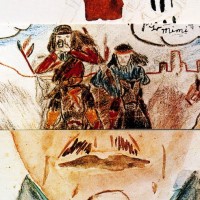To have been such a breakthrough hit for John Lennon as a solo artist, to have been the last we’d hear from the former Beatle for half a decade, Walls and Bridges receives precious little attention these days.
Maybe it’s the period-piece production values, from its shag-carpeted strings to its bawdy lost-weekend saxophones. Maybe being lodged in the middle between Lennon’s harrowing 1970 post-Fab masterwork Plastic Ono Band and his bucolic, nostalgia-filled finale, 1980’s Double Fantasy, has forever relegated this 1974 effort to a dust-covered second tier.
Dig deeper, however, and Walls and Bridges — issued this week in the UK, 40 years ago — boasts every bit of the probing wit associated with POB, leavened with the pop sensibilities of Imagine and then sparked up with a new fondness for the funkier sounds associated with R&B and disco. There’s a raw, sometimes utterly bleak, edginess to much of the album (“Scared,” which morphs lyrically into “Scarred,” is as harrowing as anything he ever did), but Lennon mixes in no small amount of party rock (notably on “Surprise, Surprise [Sweet Bird of Paradox]” and the charttopping Elton John collaboration “Whatever Gets You Thru The Night”), too.
If not for the studio excesses of its era, Walls and Bridges might have been in the same conversation with Lennon’s heralded solo debut all along. To my mind, it still should be.
“Going Down on Love,” boasting a winking double entendre, begins things with an anxious energy — and an early hint at Lennon’s newfound appreciation for his own hitmaking past. Here, Lennon quotes “Help.” One track later, on the retro-hedonistic “Whatever Gets You,” his melody recalls “Jealous Guy” — opening the door for a series of snarky aphorisms straight out of the Beatles playbook. “Surprise Surprise,” with another assist from Elton John, cheekily references “Drive My Car,” and Lennon ends things (in the grand tradition of “Her Majesty”) with a throwaway version of “Ya Ya” featuring his young son Julian Lennon. Along the way, Lennon finally connects his early solo career’s edgy confrontational manner with what came before.
And yet Walls and Bridges continually steers determinedly toward the unexpected. His narrative pacing, in fact, was never better attenuated.
For instance, Lennon couples “Old Dirt Road,” a mournfully atmospheric collaboration with Harry Nilsson, with the Latin-tinged “What You Got” — which retrofits a line from Little Richard’s “Rip It Up” into an almost hopeless call for lost love. “Bless You,” jazzy and confessional, sits in brilliant contrast to the dreamscape majesty of “#9 Dream,” a song of stirring musical ambition that combines the basic musical tenets of “I Am the Walrus” with “I’m So Tired” by way of an orchestral idea originally constructed for Nilsson’s “Many Rivers to Cross.” (Jesse Ed Davis’ woebegone, actually George Harrison-like guitar work only adds to the Beatle-y feel.)
Lennon makes a strident attack on his former manager Allen Klein with “Steel and Glass,” happily joins in a twin-guitar attack with Davis on completely fonky “Beef Jerky” (his only post-Beatles instrumental) and makes a shop-worn cliche shatteringly real with “”Nobody Loves You (When You’re Down and Out)” — this saloon song that would have melted even Frank Sinatra’s whiskey-hardened heart.
Much has been made, over the years, of Lennon’s drink-fueled misdeeds during this period of separation from Yoko Ono — and that’s perhaps sullied the perception of his work product, too.
In truth, however, Walls and Bridges was not an aberration in becoming both his first No. 1 album and the source of his initial chart-topping single. Remember, this same 16-month era of debauched second bachelorhood found Lennon scoring a Top 10 charter in “#9 Dream” and a Top 20 hit in his remake of “Stand By Me”; making important assists on a pair of other No. 1 smashes (David Bowie’s “Fame,” and Elton John’s update of “Lucy in the Sky with Diamonds”); giving away notable songs to Ringo Starr (the Top 10 hit “Goodnight Vienna”), Johnny Winter (“Rock and Roll People”) and Keith Moon (“Move Over Ms. L”); and producing Nilsson’s 1974 album Pussy Cats.
This was, it’s clear, Lennon’s most productive period as a solo artist — and it’s long past time that Walls and Bridges was recognized as its too-often-forgotten capstone.
- How Deep Cuts on ‘Music From Big Pink’ Underscore the Band’s Triumph - July 31, 2023
- How ‘Islands’ Signaled the Sad End of the Band’s Five-Man Edition - March 15, 2022
- The Band’s ‘Christmas Must Be Tonight’ Remains an Unjustly Overlooked Holiday Classic - December 25, 2016




